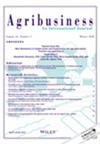城乡一体化能否减少农村贫困?
IF 2.1
3区 经济学
Q2 AGRICULTURAL ECONOMICS & POLICY
引用次数: 0
摘要
减少农村贫困是全世界面临的一项挑战。城乡一体化不仅是城乡发展的结果,也是减贫的原因。然而,很少有研究采用实证方法来考察城乡一体化的社会影响。在此背景下,本研究采用实证方法,从微观层面分析城乡一体化对农村减贫的影响。研究发现,城乡一体化可以减少农村家庭的绝对贫困和相对收入贫困。主要渠道是农村家庭获得医疗服务。然而,这其中存在地区异质性和家庭异质性。对于经济落后的西部地区,城乡一体化并不能减少农村家庭的贫困。户主的年龄、健康状况和工作会影响城乡一体化对减少农村家庭贫困的效果。城乡一体化和扶贫开发工作应更加关注资源和服务的获取,并针对不同地区采取差异化政策。[经济学引文:R1]本文章由计算机程序翻译,如有差异,请以英文原文为准。
Does urban–rural integration reduce rural poverty?
Rural poverty reduction is a challenge worldwide. Urban–rural integration is not only the result of urban and rural development but also the cause of poverty alleviation. Few studies, however, have used empirical methods to examine the social impact of urban–rural integration. Against the Chinese background, this study adopts an empirical method to analyze the impact of urban–rural integration on rural poverty reduction at the micro level. The study finds that urban–rural integration can reduce rural households' absolute poverty and relative income poverty. The main channel is the access of rural households to medical services. However, there is regional heterogeneity and household heterogeneity. Urban–rural integration cannot reduce rural household poverty for the western regions with backward economies. Household heads' age, health and job will impact the effect of urban–rural integration on reducing rural household poverty. Urban–rural integration and poverty alleviation development work should pay more attention to access to resources and services and adopt differentiated policies for different regions. [EconLit Citations: R1]
求助全文
通过发布文献求助,成功后即可免费获取论文全文。
去求助
来源期刊

Agribusiness
农林科学-食品科技
CiteScore
5.50
自引率
6.20%
发文量
58
审稿时长
6 months
期刊介绍:
Agribusiness: An International Journal publishes research that improves our understanding of how food systems work, how they are evolving, and how public and/or private actions affect the performance of the global agro-industrial complex. The journal focuses on the application of economic analysis to the organization and performance of firms and markets in industrial food systems. Subject matter areas include supply and demand analysis, industrial organization analysis, price and trade analysis, marketing, finance, and public policy analysis. International, cross-country comparative, and within-country studies are welcome. To facilitate research the journal’s Forum section, on an intermittent basis, offers commentary and reports on business policy issues.
 求助内容:
求助内容: 应助结果提醒方式:
应助结果提醒方式:


